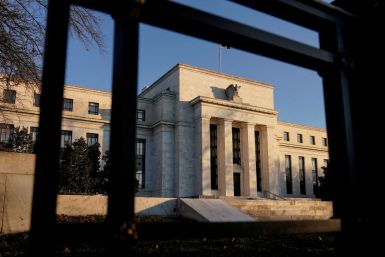European and U.S. bank shares on Friday clawed back some of the previous day's steep losses as the sector started to get to grips with a slew of sanctions unveiled this week in retaliation for Russia's invasion of Ukraine.
European bank shares remained unsteady on Friday after steep falls a day earlier, as bankers grapple with the potential impact of a slew of sanctions following Russia's invasion of Ukraine.
The rouble firmed on Friday after hitting all-time lows the previous day when Russia began invading Ukraine, while stock indexes rose sharply after their biggest one-day fall on record and the central bank stepped up support for sanctioned banks.
Russia has spent the past seven years building up formidable financial defences, yet in the long run, its economy is unlikely to withstand the onslaught of coordinated sanctions from the West.
Shaken by a liquidity crunch among developers, China's property market is expected to stay soft in the first half of 2022 before rebounding later in the year as policies aimed at encouraging buyers helps sentiment recover, a Reuters poll showed.
Shaken by a liquidity crunch among developers, China's property market is expected to stay soft in the first half of 2022 before rebounding later in the year as policies aimed at encouraging buyers helps sentiment recover, a Reuters poll showed.
Japan's industrial output likely fell for a second month in January as the fast spread of the Omicron COVID-19 variant disrupted car production, a Reuters poll showed.
European stocks rose on Friday following Wall Street's dramatic late rally, as investors welcomed coordinated Western sanctions against Russia that targeted its banks but left its energy sector largely untouched.
Stocks around the world were rebounding on Friday and U.S.
Asian markets rebounded on Friday following Wall Street's surprising overnight reversal, as investors weighed the longer-term impact of tough Western sanctions against Russia after it
Stocks around the world rebounded on Friday, the U.S.
European stocks rose on Friday after Wall Street's late rally, as investors welcomed coordinated Western sanctions on Russia that targeted its banks but not did not block it from a global payments system and left its energy sector largely untouched.
EU states agreed to freeze any European assets of Russian President Vladimir Putin and his foreign minister on Friday, as Ukraine's leader pleaded for faster and more forceful action to punish Russia's invasion of his country.
EU states agreed to freeze any European assets of Russian President Vladimir Putin and his foreign minister on Friday, as Ukraine's leader pleaded for faster and more forceful sanctions to punish Russia's invasion of his country.
The European Union is planning a third package of sanctions against Moscow, EU officials said on Friday, as Ukraine's president pleaded with the bloc for faster and more forceful steps to punish Russia for its invasion of his country.
The United States on Thursday restricted exports to Russia of a broad set of U.S.-made products as well as foreign-produced goods built with U.S.
The euro steadied on Friday following Thursday's sharp declines after Russia's all-out invasion of Ukraine unleashed the biggest attack on an European state since World War Too.
The dollar retreated against most currencies, including the euro, on Friday, as markets walked back some of the tumultuous moves from the previous day when Russia's invasion of Ukraine sent investors scrambling.
The U.S. dollar dipped on Friday, giving back some of the strong gains from the previous day, as investors gauged the latest round of sanctions on Russia and U.S.
The U.S. dollar dipped on Friday, a day after notching its biggest one-day percentage gain in more than three months, as investors gauged the latest round of sanctions on Russia and U.S.
Federal Reserve Governor Christopher Waller on Thursday laid out the case for a "concerted" effort to rein in inflation, calling for raising interest rates a full percentage point by mid-year, starting with a half-percentage-point hike in March if data in coming weeks continues to point to an "exceedingly hot" economy.
Consumer inflation in Japan's capital accelerated in February at the fastest annual pace in more than two years, suggesting that soaring fuel and food costs will weigh on consumption and the country's fragile economic recovery.
Federal Reserve policymakers on Thursday signaled the conflict in Ukraine will not budge them from their expected course of rate hikes ahead.
Brazil's central bank said it is prepared to act in the exchange market in case of disproportionate contamination on prices, highlighting it is paying close attention to recent developments abroad after Ukraine's invasion by Russia.
Soaring house prices in New Zealand will grind to a halt this year and Australia will follow suit in 2023 as expected higher interest rates rein in two housing markets that are among the least affordable in the world, a Reuters poll predicted.
Australia's central bank will raise interest rates for the first time in over a decade in the third quarter, slightly earlier than thought a month ago, according to a Reuters poll of economists who see rates by year-end at 0.50%, up from 0.25% previously.
The conflict unfolding in Ukraine could have an effect on the U.S.
Global fund managers have been cutting back their Russian investments as they braced for the country's invasion of Ukraine. Now hopes of any respite have also been dashed.
The U.S. Federal Reserve's battle against inflation, already complicated by the unpredictable impact of a once-in-a-century pandemic, now faces a likely energy price shock and another layer of uncertainty following Russia's military move into Ukraine.
Exchange-traded funds (ETFs) that invest in gold and other precious metals have seen massive inflows as investors rush to shield themselves against the rising geopolitical tensions between Russia and Ukraine.






































